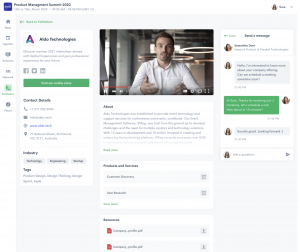How many events, conferences or forums had to be cancelled starting March or have successfully transformed into their virtual versions? We have all come across quite a few. Egypt, being a flourishing destination for events, meetings and conferences has seen its PR and events industry witness “a very severe downturn in their activities as all gatherings of any kind were indefinitely suspended.”
Dina El Sowefy, founder and managing director of Mount PR, an esteemed PR and communications firm, argues that despite the losses incurred due to the cancelation of physical events, there had actually been a higher demand for PR activities since the onset of lockdown era, especially crisis communication management. On the negative side, El Soweify explains that some of the company’s clients were hit during the crisis and were left with no choice but to freeze their contracts. “Regarding these clients as partners, we understood the situation and even offered to reduce our fees,” while hoping the situation would soon get better.
El Soweify shares with Business Forward her company’s strategy during the most uncertain times of the COVID-19 crisis. “Building on our experience of witnessing two revolutions and a lot of turmoil, we immediately identified a need for crisis communication manuals, and we proactively provided this to our clients. Not only has the crisis heightened the need for businesses to communicate, it also pushed them to expand their Corporate Social Responsibility (CSR) activities. At Mount PR, we started at the early days of the crisis by scouting community initiatives that would benefit from CSR and we pitched those to our clients, who chose to contribute timely to one or more initiatives.”
The need for businesses to communicate directly with the public left them little choice but to maneuver around the readily available digital meeting tools, the most popular of which is ‘Zoom’ – the platform on which more than 300 million daily meeting participants attend virtual meetings, webinars and events. This has had an obvious upside to it, despite some network connectivity challenges, according to El Sewefy, when it comes to the potential reach of media roundtables for instance, eliminating traditional barriers to participation such as traffic, commuting time, office commitments, and travel costs.
Amr Abu El Azm, chairman and board member of Tamweely Microfinance, explains that his company often needs to publicly communicate its mission and progress to reach clients, governmental partners and finance providers.
“If the event cannot be done physically, then going virtual with the available tools is definitely the best option.” In fact, Abu El Azm shares that the media coverage of the company’s virtual media roundtables was higher than usual due to easy access of media participants to the event from the comfort of their homes. As a company that is keen to contribute to building knowledge about microfinance among media and eventually the general public, virtual roundtables constitute a potential tool to consistently do so.
Mai Salama, founding partner of the Creative Industry Summit and managing partner of The Worx for event management speaks to Business Forward about the thought process behind executing the Summit it its first virtual edition last month; “Everyone was accepting the changes and experimenting with different formats, and there was a massive amount of content being shared online since COVID-19 hit, and this was an amazing thing. But as we decided in April to go ahead with the summit, we had to find different angles and make sure we are providing the ‘never been seen’ content and involving strong professionals and keynote speakers.”
The Creative Industry Summit took place on July 20-21, 2020 attracting audience from fourteen countries and top notch international speakers including Sir Martin Sorrell, Rob Reilly, Simon Cook, Jeffrey Nickolson, among others, in addition to prominent speakers from within the country.

©The Worx/2020
“It would have been very difficult and almost impossible to have these people fly to Egypt amidst their extremely busy schedules,” says Salama. The use of virtual conferencing tools had opened up new possibilities, despite the worry of the organizers venturing with this new format. “We didn’t want this to be just another zoom meeting or webinar; we wanted the full-on e-conference experience,” continues Salama, further explaining how The Worx designed this special edition considering what it means to be participating in a day-long event from home. Short and long breaks were planned in the agenda; entertainment segments were included at the end of each day; online competitions; more interviews; and diversified international panels, were all some of the ways the event organizers kept the experience engaging. “One of the panels had two speakers from the USA, one from the UAE, one from Malaysia, one from Saudi Arabia and one from Egypt. This would not have been easy in the physical event, so that was the silver lining of COVID-19 with all the difficulties it brought,” says Salama.
The restrictions that everyone had to abide by have definitely driven creativity and opened up possibilities. “Even when restrictions are eased or lifted, we can now consider a virtual version of the event running in parallel with the physical one to attract international audiences. We also now have the courage to integrate live sessions with international speakers instead of recorded ones as we used to do before,” shares Salama, reiterating that virtual event experiences have now been tried and tested, and well accepted.
The Creative Industry Summit, The Architecture Summit, Techila Conference, and this month’s Rise Up Summit, among others, have all used a conferencing tool developed by Eventtus, an events management agency established in 2012 and based between Cairo and Dubai. “Our mission has always been to use technology to optimize events and there was no better time to do so,” says Mai Medhat, CEO of Eventtus, sharing how her company has acted in full speed and capacity to meet clients’ rising needs for technological solutions for their planned events, amidst the peak of the COVID-19 health crisis.
Eventtus had already been providing tools for ticketing, registration, event promotion and online methods of communicating with participants such as event apps. What was new was building on the existing features of the tools for clients to be able to host and manage an event completely online, in a way that simulates what happens in a real event as much as possible.
Six months ago, it was unlikely for us to visualize arriving to an event via a web page that acts as the meeting venue lobby, where we would virtually sign in to obtain our event ID or badge, and enter the meeting room with our topic of interest via a hyperlink, interact and network with speakers and other participants in chat rooms, and scroll around a screen of exhibitors displaying their company’s promo video and their brochures as downloadable PDFs, with their teams available online to answer questions.
“We have to keep in mind though that meeting people face to face is a human experience that cannot be replaced. We are creating a tool that matches the different user behavior when people are participating from their homes with a set of different distractions,” reflects Medhat.
Medhat speaks to Business Forward about a whole range of perks that presented themselves as the industry creatively experimented and introduced solutions. Virtual events are in general more efficient for the organizers, sponsors and exhibitors who will save on costs of venue set-up, sound systems, printing, booth productions, even making the virtual option much more eco-friendly. Another interesting aspect was the possibility to calculate the Return on Investment (ROI) for sponsors and exhibitors due to the easiness of generating analytics on the number of users who visited the virtual booth, or the number of users who clicked or downloaded the displayed material. Networking online might be easier for some people compared to face-to-face and so would maximize the benefit they could obtain from the event, and they could easily track how many people they spoke with and follow up on that. “It’s the same idea of digital advertising when it first emerged,” elaborates Medhat, “some businesses still preferred traditional advertising, while others preferred to experiment with the idea of going to the target audience on Google or Facebook rather than wait for them to come across their physical ad.”

©Eventtus/2020
“Virtual events are here to stay, and we will see more hybrid events, as well as the technology advancing to allow for more and more options,” predicts Medhat, who strongly believes that the industry will challenge itself to create solutions for clients from different sectors including furniture and real estate exhibitors for example. The industry that has hardly changed for decades is effectively reshaping itself.
“Life gives us alternatives, and these virtual tools are a blessing allowing us to still communicate despite all the different circumstances we passed through,” reflects El Sowefy.









